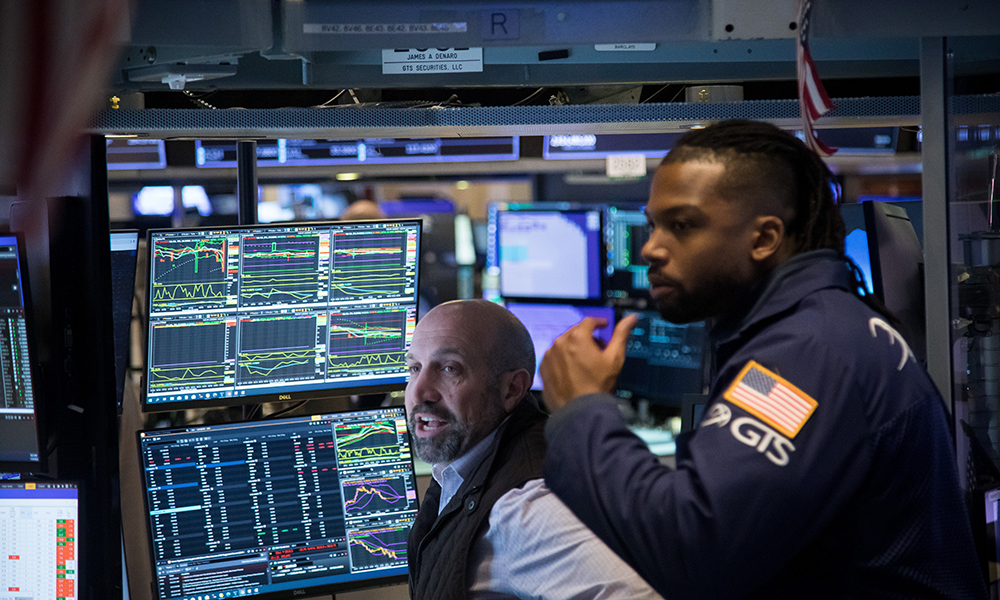
近日有報(bào)告顯示,美國(guó)今年10月的通脹緩解幅度超過(guò)預(yù)期,,受此利好消息影響,,美股在11月10日出現(xiàn)了近兩年來(lái)的單日最大漲幅。
其中,,標(biāo)準(zhǔn)普爾500指數(shù)(S&P 500)上漲了5.5%,,道瓊斯工業(yè)平均指數(shù)(Dow Jones Industrial Average)上漲1,200點(diǎn),納斯達(dá)克綜合指數(shù)(Nasdaq Composite)單日飆升7.4%,,幾乎創(chuàng)下了一整年的漲幅,。
隨著投資者認(rèn)為最嚴(yán)重的通脹已經(jīng)過(guò)去,美國(guó)證券市場(chǎng)從金屬期貨到歐洲股票的各種投資品價(jià)格都在上漲,。不過(guò)有分析師提醒道,,現(xiàn)在斷言惡性通脹已經(jīng)結(jié)束還為時(shí)過(guò)早。就連前一陣因?yàn)樾湃挝C(jī)而大跌的比特幣(Bitcoin)也收復(fù)了部分失地,。
最劇烈的波動(dòng)發(fā)生在債券市場(chǎng),。由于投資者對(duì)美聯(lián)儲(chǔ)(Federal Reserve)進(jìn)一步加息控制通脹的預(yù)期下降,美國(guó)國(guó)債的收益率顯著下跌,。而美聯(lián)儲(chǔ)的大幅加息正是美股市場(chǎng)今年表現(xiàn)慘淡的主要原因,,也是有可能讓美國(guó)經(jīng)濟(jì)陷入衰退的一個(gè)重要因素,。
十年期美債收益率是美國(guó)抵押貸款等許多貸款的基準(zhǔn)利率,11月10日,,十年期美債收益率從4.15%下跌至3.82%,。這種下跌對(duì)于債券市場(chǎng)是很不尋常的,幾乎創(chuàng)下2009年以來(lái)的單日最大跌幅,。更能代表美聯(lián)儲(chǔ)控制通脹預(yù)期的兩年期美債收益率也從4.62%下跌至4.32%,,有望創(chuàng)下2008年以來(lái)的最大跌幅。
11月10日,,美股和美債市場(chǎng)的劇烈動(dòng)蕩,,主要?dú)w功于美國(guó)政府的一份報(bào)告,該報(bào)告顯示,,美國(guó)的通脹率自今年6月探頂以來(lái)(9.1%),,至今年10月已經(jīng)連續(xù)四個(gè)月出現(xiàn)放緩。10月7.7%的通脹率也低于經(jīng)濟(jì)學(xué)家預(yù)測(cè)的8%,。
更重要的是,,在忽略糧食和能源價(jià)格后,美國(guó)通脹的緩解速度甚至超過(guò)了預(yù)期,。這也是美聯(lián)儲(chǔ)更關(guān)注的一個(gè)指標(biāo),。另外,9月和10月的通脹也超過(guò)了此前的預(yù)期,。
Allspring Global Investments公司的高級(jí)投資策略師布萊恩·雅各布森指出:“月度環(huán)比通脹率所代表的信息更多,,按照這個(gè)標(biāo)準(zhǔn)衡量,美國(guó)的通脹率仍然很高,,但并非高得可怕,。”
隨著通脹率放緩,,美聯(lián)儲(chǔ)可能將不再采取特別激進(jìn)的加息策略,。最近一段時(shí)間以來(lái),美國(guó)已經(jīng)從今年3月的零利率,,加息到了3.75%到4%的區(qū)間,。
今年夏天,美國(guó)的惡性通脹達(dá)到近40年來(lái)的最高水平,。通過(guò)大幅加息,,美聯(lián)儲(chǔ)有意放慢了經(jīng)濟(jì)和就業(yè)市場(chǎng)的增長(zhǎng)速度,希望以此來(lái)降低通脹,。但大幅加息的風(fēng)險(xiǎn)在于有可能導(dǎo)致經(jīng)濟(jì)衰退,。同時(shí)加息也會(huì)拉低股票和其他投資品的價(jià)格。
加息尤其會(huì)打擊高增長(zhǎng)的科技股,、數(shù)字貨幣以及其他高風(fēng)險(xiǎn)高價(jià)格的投資品,。
在這份報(bào)告發(fā)布后,,大型科技股成了華爾街最活躍的股票之一。其中蘋(píng)果(Apple)報(bào)漲8.9%,,微軟(Microsoft)報(bào)漲8.2%,,亞馬遜(Amazon)報(bào)漲12.2%。
以科技股為主的納斯達(dá)克綜合指數(shù)創(chuàng)下自2020年3月美國(guó)新冠疫情爆發(fā)以來(lái)的單日最高漲幅,。而主題較為均衡的標(biāo)準(zhǔn)普爾500指數(shù)作為很多401(k)養(yǎng)老基金的最愛(ài),,也迎來(lái)了自2020年4月以來(lái)的單日最高漲幅。
標(biāo)準(zhǔn)普爾500指數(shù)上升207.80點(diǎn),,報(bào)3,956.37點(diǎn),。道瓊斯指數(shù)上升1,201.43點(diǎn),報(bào)3,715.37點(diǎn),,漲幅3.7%,。納斯達(dá)克指數(shù)上升760.97點(diǎn),報(bào)11,114.15點(diǎn),,漲幅達(dá)7.4%,。
前一段時(shí)間,美聯(lián)儲(chǔ)的持續(xù)加息使按揭貸款利率達(dá)到了整個(gè)房地產(chǎn)行業(yè)都受到打壓的水平,。隨著市場(chǎng)預(yù)期美聯(lián)儲(chǔ)將放寬加息力度,,房地產(chǎn)建筑企業(yè)和房地產(chǎn)行業(yè)的其他公司也出現(xiàn)了強(qiáng)勢(shì)增長(zhǎng)。其中PulteGroup公司上漲13.5%,,萊納公司(Lennar)上漲12.6%,,是標(biāo)準(zhǔn)普爾500指數(shù)中表現(xiàn)較為搶眼的房地產(chǎn)公司之一。
隨著通脹的放緩,,美聯(lián)儲(chǔ)有可能會(huì)在今年12月的政策會(huì)議上下調(diào)加息幅度,之前美聯(lián)儲(chǔ)已經(jīng)連續(xù)四次加息0.75個(gè)百分點(diǎn),。下一步,,美聯(lián)儲(chǔ)有望回歸0.25%的小幅加息路徑,甚至最終停止加息,。
在11月10日的通脹報(bào)告發(fā)布后,,華爾街交易們開(kāi)始押注下個(gè)月美聯(lián)儲(chǔ)將只加息0.5%,而不是更大幅度的加息,。
盡管11月10日的通脹數(shù)據(jù)令人鼓舞,,但分析師警告稱,美聯(lián)儲(chǔ)遏制通脹的行動(dòng)可能遠(yuǎn)未結(jié)束,。以前的通脹數(shù)據(jù)也曾經(jīng)給過(guò)人虛假的希望,,結(jié)果通脹卻一再惡化。
摩根士丹利全球投資辦公室(Morgan Stanley Global Investment Office)的投資建模主管邁克·勒文加特說(shuō):“美聯(lián)儲(chǔ)堅(jiān)持在通脹放緩前不會(huì)停止加息,。盡管這次市場(chǎng)反彈說(shuō)明投資者認(rèn)為他們已經(jīng)看到了曙光,,但美聯(lián)儲(chǔ)在下次做出加息決定前,,還會(huì)再收集一次數(shù)據(jù)。而且要記住,,就算我們看到通脹放緩了,,物價(jià)也仍然處于高位,要恢復(fù)正常還有很長(zhǎng)一段路要走,?!?/p>
11月11日發(fā)布的另一份報(bào)告也有可能震動(dòng)華爾街,那份報(bào)告就是美國(guó)家庭對(duì)未來(lái)幾年通脹程度的預(yù)期,。美聯(lián)儲(chǔ)主席杰羅姆·鮑威爾曾經(jīng)表示,,他特別關(guān)注這種預(yù)期。
美聯(lián)儲(chǔ)之所以如此熱衷于加息,,就是因?yàn)橄M苊獬霈F(xiàn)惡性循環(huán),,即高通脹改變了人們的消費(fèi)方式,而這反過(guò)來(lái)又導(dǎo)致了更高的通脹,。(財(cái)富中文網(wǎng))
譯者:樸成奎
近日有報(bào)告顯示,,美國(guó)今年10月的通脹緩解幅度超過(guò)預(yù)期,受此利好消息影響,,美股在11月10日出現(xiàn)了近兩年來(lái)的單日最大漲幅,。
其中,標(biāo)準(zhǔn)普爾500指數(shù)(S&P 500)上漲了5.5%,,道瓊斯工業(yè)平均指數(shù)(Dow Jones Industrial Average)上漲1,200點(diǎn),,納斯達(dá)克綜合指數(shù)(Nasdaq Composite)單日飆升7.4%,幾乎創(chuàng)下了一整年的漲幅,。
隨著投資者認(rèn)為最嚴(yán)重的通脹已經(jīng)過(guò)去,,美國(guó)證券市場(chǎng)從金屬期貨到歐洲股票的各種投資品價(jià)格都在上漲。不過(guò)有分析師提醒道,,現(xiàn)在斷言惡性通脹已經(jīng)結(jié)束還為時(shí)過(guò)早,。就連前一陣因?yàn)樾湃挝C(jī)而大跌的比特幣(Bitcoin)也收復(fù)了部分失地。
最劇烈的波動(dòng)發(fā)生在債券市場(chǎng),。由于投資者對(duì)美聯(lián)儲(chǔ)(Federal Reserve)進(jìn)一步加息控制通脹的預(yù)期下降,,美國(guó)國(guó)債的收益率顯著下跌。而美聯(lián)儲(chǔ)的大幅加息正是美股市場(chǎng)今年表現(xiàn)慘淡的主要原因,,也是有可能讓美國(guó)經(jīng)濟(jì)陷入衰退的一個(gè)重要因素,。
十年期美債收益率是美國(guó)抵押貸款等許多貸款的基準(zhǔn)利率,11月10日,,十年期美債收益率從4.15%下跌至3.82%,。這種下跌對(duì)于債券市場(chǎng)是很不尋常的,幾乎創(chuàng)下2009年以來(lái)的單日最大跌幅。更能代表美聯(lián)儲(chǔ)控制通脹預(yù)期的兩年期美債收益率也從4.62%下跌至4.32%,,有望創(chuàng)下2008年以來(lái)的最大跌幅,。
11月10日,美股和美債市場(chǎng)的劇烈動(dòng)蕩,,主要?dú)w功于美國(guó)政府的一份報(bào)告,,該報(bào)告顯示,美國(guó)的通脹率自今年6月探頂以來(lái)(9.1%),,至今年10月已經(jīng)連續(xù)四個(gè)月出現(xiàn)放緩,。10月7.7%的通脹率也低于經(jīng)濟(jì)學(xué)家預(yù)測(cè)的8%。
更重要的是,,在忽略糧食和能源價(jià)格后,,美國(guó)通脹的緩解速度甚至超過(guò)了預(yù)期。這也是美聯(lián)儲(chǔ)更關(guān)注的一個(gè)指標(biāo),。另外,,9月和10月的通脹也超過(guò)了此前的預(yù)期。
Allspring Global Investments公司的高級(jí)投資策略師布萊恩·雅各布森指出:“月度環(huán)比通脹率所代表的信息更多,,按照這個(gè)標(biāo)準(zhǔn)衡量,,美國(guó)的通脹率仍然很高,但并非高得可怕,?!?/p>
隨著通脹率放緩,美聯(lián)儲(chǔ)可能將不再采取特別激進(jìn)的加息策略,。最近一段時(shí)間以來(lái),,美國(guó)已經(jīng)從今年3月的零利率,加息到了3.75%到4%的區(qū)間,。
今年夏天,,美國(guó)的惡性通脹達(dá)到近40年來(lái)的最高水平。通過(guò)大幅加息,,美聯(lián)儲(chǔ)有意放慢了經(jīng)濟(jì)和就業(yè)市場(chǎng)的增長(zhǎng)速度,,希望以此來(lái)降低通脹。但大幅加息的風(fēng)險(xiǎn)在于有可能導(dǎo)致經(jīng)濟(jì)衰退,。同時(shí)加息也會(huì)拉低股票和其他投資品的價(jià)格。
加息尤其會(huì)打擊高增長(zhǎng)的科技股,、數(shù)字貨幣以及其他高風(fēng)險(xiǎn)高價(jià)格的投資品,。
在這份報(bào)告發(fā)布后,大型科技股成了華爾街最活躍的股票之一,。其中蘋(píng)果(Apple)報(bào)漲8.9%,,微軟(Microsoft)報(bào)漲8.2%,亞馬遜(Amazon)報(bào)漲12.2%。
以科技股為主的納斯達(dá)克綜合指數(shù)創(chuàng)下自2020年3月美國(guó)新冠疫情爆發(fā)以來(lái)的單日最高漲幅,。而主題較為均衡的標(biāo)準(zhǔn)普爾500指數(shù)作為很多401(k)養(yǎng)老基金的最愛(ài),,也迎來(lái)了自2020年4月以來(lái)的單日最高漲幅。
標(biāo)準(zhǔn)普爾500指數(shù)上升207.80點(diǎn),,報(bào)3,956.37點(diǎn),。道瓊斯指數(shù)上升1,201.43點(diǎn),報(bào)3,715.37點(diǎn),,漲幅3.7%,。納斯達(dá)克指數(shù)上升760.97點(diǎn),報(bào)11,114.15點(diǎn),,漲幅達(dá)7.4%,。
前一段時(shí)間,美聯(lián)儲(chǔ)的持續(xù)加息使按揭貸款利率達(dá)到了整個(gè)房地產(chǎn)行業(yè)都受到打壓的水平,。隨著市場(chǎng)預(yù)期美聯(lián)儲(chǔ)將放寬加息力度,,房地產(chǎn)建筑企業(yè)和房地產(chǎn)行業(yè)的其他公司也出現(xiàn)了強(qiáng)勢(shì)增長(zhǎng)。其中PulteGroup公司上漲13.5%,,萊納公司(Lennar)上漲12.6%,,是標(biāo)準(zhǔn)普爾500指數(shù)中表現(xiàn)較為搶眼的房地產(chǎn)公司之一。
隨著通脹的放緩,,美聯(lián)儲(chǔ)有可能會(huì)在今年12月的政策會(huì)議上下調(diào)加息幅度,,之前美聯(lián)儲(chǔ)已經(jīng)連續(xù)四次加息0.75個(gè)百分點(diǎn)。下一步,,美聯(lián)儲(chǔ)有望回歸0.25%的小幅加息路徑,,甚至最終停止加息。
在11月10日的通脹報(bào)告發(fā)布后,,華爾街交易們開(kāi)始押注下個(gè)月美聯(lián)儲(chǔ)將只加息0.5%,,而不是更大幅度的加息。
盡管11月10日的通脹數(shù)據(jù)令人鼓舞,,但分析師警告稱,,美聯(lián)儲(chǔ)遏制通脹的行動(dòng)可能遠(yuǎn)未結(jié)束。以前的通脹數(shù)據(jù)也曾經(jīng)給過(guò)人虛假的希望,,結(jié)果通脹卻一再惡化,。
摩根士丹利全球投資辦公室(Morgan Stanley Global Investment Office)的投資建模主管邁克·勒文加特說(shuō):“美聯(lián)儲(chǔ)堅(jiān)持在通脹放緩前不會(huì)停止加息。盡管這次市場(chǎng)反彈說(shuō)明投資者認(rèn)為他們已經(jīng)看到了曙光,,但美聯(lián)儲(chǔ)在下次做出加息決定前,,還會(huì)再收集一次數(shù)據(jù)。而且要記住,,就算我們看到通脹放緩了,,物價(jià)也仍然處于高位,,要恢復(fù)正常還有很長(zhǎng)一段路要走?!?/p>
11月11日發(fā)布的另一份報(bào)告也有可能震動(dòng)華爾街,,那份報(bào)告就是美國(guó)家庭對(duì)未來(lái)幾年通脹程度的預(yù)期。美聯(lián)儲(chǔ)主席杰羅姆·鮑威爾曾經(jīng)表示,,他特別關(guān)注這種預(yù)期,。
美聯(lián)儲(chǔ)之所以如此熱衷于加息,就是因?yàn)橄M苊獬霈F(xiàn)惡性循環(huán),,即高通脹改變了人們的消費(fèi)方式,,而這反過(guò)來(lái)又導(dǎo)致了更高的通脹。(財(cái)富中文網(wǎng))
譯者:樸成奎
Wall Street blasted off on November 10 to soar to its best day in more than two years as exhilaration swept through markets after a report showed inflation in the United States eased in October by even more than expected.
The S&P 500 surged 5.5%, while the Dow Jones Industrial Average leaped 1,200 points and the Nasdaq composite packed what could be a year’s worth of gains into one day by roaring 7.4% higher.
Prices jumped for everything from metals to European stocks as investors took the data as a sign that the worst of high inflation may finally have passed, though analysts cautioned it’s still premature to declare that with certainty. Even bitcoin rose to claw back some of its steep plunge from prior days caused by the crypto industry’s latest crisis of confidence.
Some of the most dramatic action was in the bond market, where Treasury yields tumbled sharply as investors pared bets for how aggressive the Federal Reserve will be in hiking interest rates to get inflation under control. Such hikes have been the main reason for Wall Street’s struggles this year and are threatening a recession.
The yield on the 10-year Treasury, which helps set rates for mortgages and other loans, fell to 3.82% from 4.15%. It’s a dramatic move for the bond market, and the yield was on track for its biggest daily drop since 2009, according to Tradeweb. The two-year yield, which more closely tracks expectations for Fed action, fell to 4.32% from 4.62% and was on pace for its sharpest fall since 2008.
All the action stemmed from a U.S. government report showing that inflation slowed in October for a fourth straight month since hitting a peak of 9.1% in June. The reading of 7.7% was better than the 8% economists were expecting.
Perhaps more importantly, inflation also slowed more than expected after ignoring the effects of food and energy prices. That’s the measure the Fed pays closer attention to. So did inflation between September and October.
“The month-on-month rate of inflation is much more informative,” said Brian Jacobsen, senior investment strategist at Allspring Global Investments. “On that measure, inflation is still high, but not scary high.”
Slower inflation could keep the Fed off the most aggressive path in raising interest rates. It’s already raised its key rate to a range of 3.75% to 4%, up from virtually zero in March.
By raising rates, the Fed is intentionally trying to slow the economy and jobs market in hopes of undercutting inflation, which hit a four-decade high in the summer. The risk is that it can create a recession if it goes too far, and higher rates drag down on prices for stocks and other investments in the meantime.
Higher rates have particularly hit high-growth tech stocks, cryptocurrencies and other investments seen as the riskiest or most expensive.
Big Tech stocks were some of the most buoyant forces on Wall Street following the inflation report. Apple rose 8.9%, Microsoft climbed 8.2% and Amazon soared 12.2%.
The Nasdaq composite, which is full of tech-oriented stocks, soared to its best day since March 2020, when Wall Street was in the midst of its frenzied recovery from the crash caused by the coronavirus. The broader S&P 500, which sits at the heart of many 401(k) accounts, had its best day since April 2020.
The S&P 500 climbed 207.80 points to 3,956.37. The Dow gained 1,201.43, or 3.7%, to 33,715.37, and the Nasdaq shot up 760.97, or 7.4%, to 11,114.15.
Homebuilders and other companies in the housing industry were also strong on hopes the Fed will take it easier on rate hikes that have already sent mortgage rates to industry-punishing levels. PulteGroup jumped 13.5%, and Lennar rose 12.6% for some of the bigger gains in the S&P 500.
Slower inflation could get the Federal Reserve to downshift the size of its rate hikes at its next policy meeting in December, after it pushed through four straight mega increases of 0.75 percentage points. That could open the way for the Fed to return to the more typical increases of 0.25 percentage points before pausing hikes completely.
Following November 10’s inflation report, traders increasingly shifted into bets for the Fed to raise rates by only 0.50 percentage points next month, instead of a bigger hike.
While November 10’s report on inflation was encouraging, analysts cautioned the Fed’s campaign against high inflation is likely still far from over. Inflation data has also given false hope before, only to reaccelerate again.
“The Fed was adamant that it won’t hit the brakes on rate hikes until inflation slows, and while the market’s rally indicates investors may see light at the end of the tunnel, it will get one more reading before its decision next month,” said Mike Loewengart, head of model portfolio construction at Morgan Stanley Global Investment Office. “Remember that even as we see a slowdown, prices remain elevated and have a long way to go before normalizing.”
Another potentially market-shaking report will hit Wall Street on November 11, when the latest reading arrives on how much inflation U.S. households see coming in future years. Fed Chair Jerome Powell has said he’s paying particularly close attention to such expectations.
One of the reasons the Fed has been so aggressive about hiking rates is because it wants avoid a debilitating cycle where expectations for high inflation push people to change their behaviors in ways that lead to even higher inflation.






